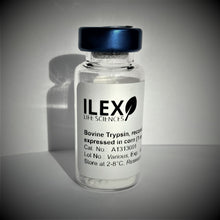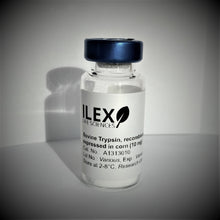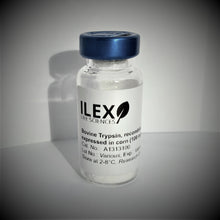Description
Our bioactive, lyophilized Recombinant Bovine Trypsin, expressed in corn plants, is free from any animal or human sources, thus eliminating animal source contaminants found in traditional bovine and porcine trypsins. Bovine Trypsin specifically cleaves peptide bonds after basic amino acids such as lysine and arginine.
- Animal-Free
- Human-Free
- No risk of BSE or other animal/human viruses
- High purity
Application
Animal-free recombinant Bovine Trypsin enzyme is used for dissociation of adhesion-dependent cells, and thus may be used to release adherent cells from tissue culture plates for passaging.
CAS Registry No.
9002-07-7
Source
Recombinantly produced in corn plants (Zea mays).
Formulation
Sterile-filtered lyophilized powder. The enzyme was lyophilized without any additives.
Reconstitution
It is recommended to reconstitute the lyophilized Recombinant Bovine Trypsin in sterile 18MΩ-cm H2O not less than 100 µg/ml, which can then be further diluted to other aqueous solutions.
Purity
Purity greater than 90% as determined by SDS-PAGE.
Biological Activity
4,313 Units/mg.
Shipping & Storage
Ships at ambient temperature. Upon receipt, store the product at the temperature recommended below:
Store the Recombinant Bovine Trypsin between 2-8°C, do not freeze.
Application Note
Cell exposure to trypsin solution should be as brief as possible. Overexposure to trypsin can damage cells. Cell cultures under serum-free conditions in general detach more readily and are more sensitive to trypsin. Failure to neutralize trypsin may result in a loss of the culture.
Serum contains natural trypsin inhibitors. In serum-free cell culture the neutralizing effect of serum is absent. Therefore, it is crucial to completely block proteolytic activity from trypsin after detachment of the cells. For inhibiting trypsin activity in serum-free culture of adherent cells, we recommend using PAN-Biotech Trypsin Inhibitor III.
Background
Trypsin is a serine protease that hydrolyses proteins, it is found in the digestive system of numerous vertebrates. Trypsin is produced as the inactive proenzyme trypsinogen in the pancreas. Trypsin cleaves peptide chains at the carboxyl side of the amino acids lysine and arginine, except when either is followed by proline. Trypsin is secreted into the duodenum, where it acts to hydrolyses peptides into amino acids, which is necessary for the uptake of protein in the food even though peptides are smaller than proteins; they are still too big to be absorbed through the lining of the ileum. The optimal operating pH for Trypsins is about 8 and about 37°C temperature. In cystic fibrosis disease there is a deficiency in transport of trypsin and other digestive enzymes from the pancreas.






